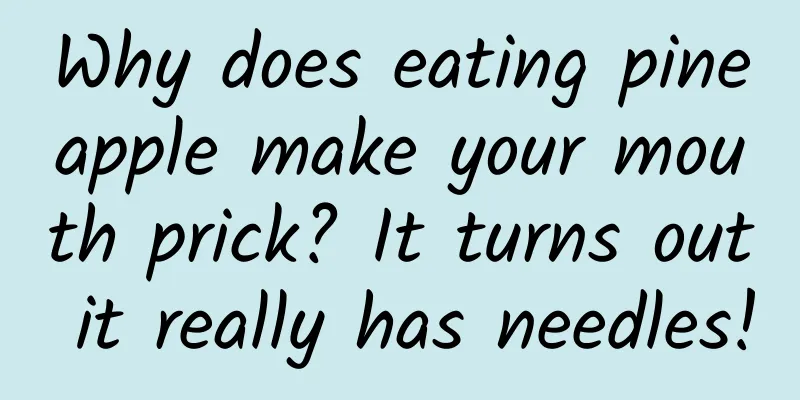Why does eating pineapple make your mouth prick? It turns out it really has needles!

|
Review expert: Shi Jun, PhD in Botany, well-known popular science writer In spring and summer, the weather gets warmer and more people come to buy fruit at street stalls. The sight of all kinds of colorful fruits makes people happy. However, there is one kind of fruit that makes people feel uneasy when eating it. When you eat it, it actually "eats you" in return! It is "pineapple". Source: pixabay Friends who have eaten pineapples know that every time after eating pineapples, the mouth always feels astringent and a little painful, as if pricked by a needle. Why is this so? Today, the editor will take you to understand it. The reason why pineapple pricks your mouth The reason why pineapple pricks your mouth is because of the bromelain and raphides it contains. When we eat pineapple, the protease rich in it will break down the fibrin on the oral mucosa, causing damage to the mucosa and causing us to feel a tingling sensation. Calcium oxalate is a white crystalline powder that appears to be in the shape of a "needle" under a microscope. Once it enters the mouth, it will pierce our oral mucosa, tongue, throat and other tissues, causing damage and creating a pricking sensation in the mouth. Some people believe that calcium oxalate is the culprit that causes pineapple to prick your mouth, rather than protease, but this statement has not yet been scientifically verified. Source: Li Xiuli, Zhang Wenjun, Lu Jianwei, Wang Lijun. Biomineralization of calcium oxalate in plants[J]. Chinese Science Bulletin, 2012, 57(26): 2443-2455. In fact, from the perspective of nature, the protease and calcium oxalate contained in pineapple build a line of defense for it, so that any animal that tastes pineapple will first taste a bit of bitterness in its mouth, thus avoiding harm from various animals and insects. Nowadays, when humans eat it as a fruit, they will inevitably have to bear the consequences of "needle prick". In order to eat pineapples without getting their mouths pricked, people use salt water to soak them, but is this really useful? Will it stop hurting you if you soak the pineapple in salt water? Let me talk about the results first. The method of using salt water to make pineapple no longer sting your mouth has limited effect, mainly because of psychological effects. The calcium oxalate in the pineapple will dissolve in the salt water , at which point it will indeed reduce the amount of calcium oxalate needles. The inhibition of bromelain activity is affected by temperature, metal ion concentration, etc., and simple salt water cannot completely solve this problem. Source: pixabay Studies have found that salt can make enzymes inactive. However, the salt used here generally refers to those "metal ion compounds", such as heavy metal salts containing lead ions, mercury ions, etc., which have a more obvious inhibitory effect on bromelain. The salt water we use to soak pineapples is salt water (NaCl). The inhibitory effect of Na+ ions on the activity of proteases is significantly worse than that of other metal ions. Therefore, if you use low-concentration salt water to soak pineapples for a relatively short time, it will not effectively inactivate the protease, but can only inhibit its activity to a small extent. Source: Ou Yingjie, Research progress on factors affecting bromelain enzyme activity and methods for determining enzyme activity, Guangdong Provincial Food Industry Public Laboratory, Guangdong Provincial Food Quality Supervision and Inspection Station In 2015, a research report in Food Science showed that soaking pineapple in 7% sodium chloride solution for 10 minutes can effectively inhibit the activity of bromelain. To make a 7% sodium chloride solution, it is equivalent to adding 70g of salt into 1 liter of water. This concentration is much higher than the salt water concentration we usually use. Therefore, soaking pineapples in salt water can only slightly suppress the irritation of the mouth, but the effect is not great. It is more of a "psychological comfort" for us. If you really hate the feeling of "stinging your mouth", you might as well try cooking the pineapple instead of soaking it in salt water. Heating will cause the protease to lose its activity, truly achieving the effect of "no stinging in the mouth". Source: pixabay So, is there any way to avoid pricking your mouth when eating pineapple? The method is also very simple, just eat "pineapple"! Why doesn’t pineapple prick your mouth? Wait, aren’t pineapples and pineapples the same species? Yes, taxonomically speaking, pineapples and pineapples are the same plant species, both belonging to the genus Ananas comosus in the Bromeliaceae family . There are four main types of edible pineapples, namely Cayenne Group, Spanish Group , Queen Group and Hybrid Group , including hundreds of varieties. Some are called pineapples, some are called pineapples, and they are different in shape, shape and size. Sometimes, based on the promotion of merchants, we can easily mistake them for different fruits. Taking 2015 as an example, most of the pineapples grown in domestic pineapple producing areas were Bali pineapples in the queen category, such as the famous Xuwen producing area. So the pineapples we often see at fruit stalls are most likely this type, with toothed leaves, orange-red peel, a strong flavor, and crispy and sweet flesh. But there is a problem of pricking the mouth. Source: Wikipedia/David Monniaux So why does eating pineapple make your mouth prickly, but eating pineapple doesn't? This is because some varieties of pineapple have a lower protease content, so there is no obvious prickly feeling when eating. For example, the more popular "Golden Diamond Pineapple" and "Perfume Pineapple" on the market. In general, the statement that soaking pineapple in salt water will not prick your mouth is not rigorous! If you really hate the prickly effect of pineapple and want to eat pineapple without it, you can also consider cooking the pineapple before eating it, or not eating pineapple and just eat "pineapple" instead. In recent years, with the continuous development of agricultural technology, more and more pineapple varieties with the trait of not pricking the mouth have begun to appear on the market. Nowadays, many pineapples available on the market can be eaten directly after being cut, without worrying about pricking the mouth. Source: Wikipedia/Eric Guinther In addition, people who are prone to allergies should also be aware that pineapples may cause oral allergy syndrome (OAS). If you experience rashes, itchy and swollen skin, or difficulty breathing after eating pineapples, you may be suffering from allergies. You should treat it according to the situation. If it is serious, you need to seek medical attention in time. Fruit is a healthy food, but how to eat it varies from person to person. The most important thing is to eat it healthily and happily. |
<<: Health protection tips during sandstorms
>>: What's wrong with breathing through your mouth?
Recommend
The ultimate tips for B2B corporate public relations and communications!
This article summarizes the "ultimate secret...
5 key points to build a private domain community from 0-1
Nowadays, private domain operations have graduall...
In 2015, Internet Marketing Will Never Be Moral
Is China's Internet in a prosperous or chaoti...
Worried about losing your job? Learn about AIGC, the "big guys" behind the popular ChatGPT and AI painting in one article
Recently, a "press release" about Hangz...
Whispering under the stars: Uncovering a corner of the mystery of the universe
In the vast universe, the Earth we live on is jus...
A guide to avoiding pitfalls from event promotion plan to implementation!
This article contains four parts: Essentially thi...
Exclusive interview with Shing-Tung Yau (Part 1): For the future of the nation, we must change China’s scientific culture
Earlier this year, Professor Shing-Tung Yau, an i...
3 traffic entrances for Douyin live broadcast room
No matter what type of live broadcast room you us...
Android source code, high imitation ink weather guide interface
Source code introduction: High imitation Moji wea...
How to attract customers to add WeChat? Three tips for beginners to attract traffic on WeChat
As one of the most commonly used interactive comm...
2018 Apple Developer Account Application Process
This article mainly explains the application proc...
How to do a good cold start? How to find 1,000 seed users?
Based on my entrepreneurial practice and observat...
Crab season is here! These 4 places are not recommended for eating crabs, but many people don’t know…
There is a poem from ancient times: "The bel...
Tencent Advertising Game Industry July Buying Volume Monthly Report & Product Dynamics
This article shares with you Tencent’s July adver...
Ruofeng's "Leader's Golden Game Short Training Camp" Master a leader's tactics in 21 days
Ruofeng's "Leader's Golden Game Shor...









